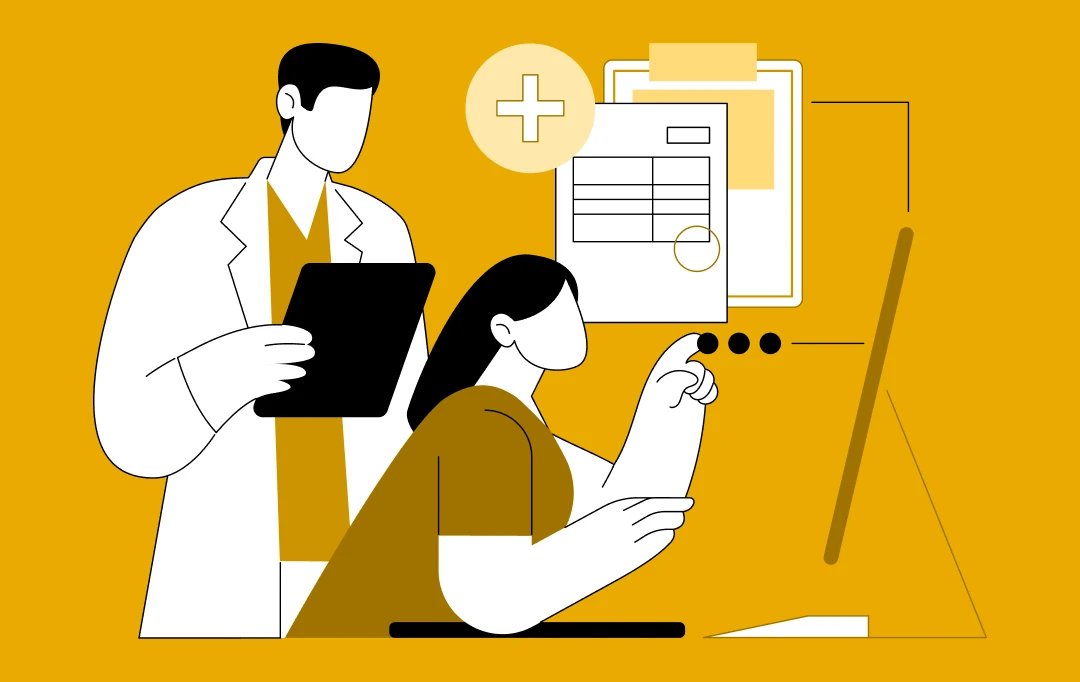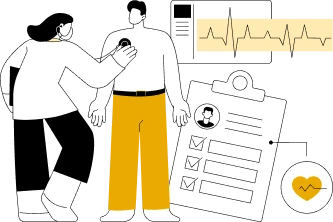- Understanding Outsourcing Healthcare IT: Definition and Scope
- Differentiators From General IT Outsourcing
- Common IT Functions Outsourced in Healthcare
- The Healthcare IT Outsourcing Market Landscape
- Geographic Market Dynamics
- Market Drivers
- Key Benefits of Healthcare IT Outsourcing
- Cost Optimization and Financial Predictability
- Access to World-Class Expertise and Innovation
- Comprehensive Compliance and Risk Mitigation
- Dynamic Scalability and Operational Agility
- Strategic Focus on Patient-Centered Care
- Best Practices to Maximize Success in Healthcare Outsourcing Services
- Define Clear Business Objectives
- Conduct Rigorous Vendor Evaluation
- Establish Transparent Communication and Governance
- Adopt Agile Methodologies
- Prioritize Security and Compliance
- Continuous Performance Monitoring
- Healthcare IT Outsourcing Implementation: A Step-by-Step Guide
- Choosing the Ideal Healthcare Outsourcing Services Partner: A Strategic Approach
- How We Helped DiabeticU Launch an AI-Powered Diabetes Management Solution
- Healthcare IT Outsourcing: A Strategic Imperative for Future-Ready Care
- Frequently Asked Questions (FAQs)
Key Takeaways
- Reduce Costs by 30-40%: Convert capital IT expenses to predictable operational costs, eliminating the need for large in-house teams and infrastructure.
- Focus on Core Patient Care: Free up internal resources from IT management to concentrate on core healthcare services, innovation, and growth.
- Ensure Compliance & Mitigate Risk: Leverage expert partners to navigate HIPAA and other regulations, securing data and preventing costly breaches.
- Accelerate Digital Adoption: Instantly access advanced tech and expertise to enhance efficiency and patient care without the learning curve.
- Achieve On-Demand Scalability: Adapt your IT infrastructure to meet changing market demands, ensuring operational agility.
Healthcare organizations worldwide face a paradox: the promise of digital transformation is immense, but so are the challenges of implementing and managing complex healthcare IT systems. Industry analyses indicate that most healthcare providers struggle with escalating IT costs, talent shortages, and fragmented legacy systems that hinder innovation and compromise the quality of patient care.
Furthermore, the global healthcare sector grapples with evolving data privacy laws—from HIPAA in the US and GDPR in Europe to the UAE’s Health Data Law—all of which demand robust compliance frameworks and sophisticated IT governance.
In this multifaceted environment, healthcare IT outsourcing emerges not merely as a cost-saving tactic but as a strategic enabler for organizations aiming to accelerate digital innovation, ensure compliance, and enhance scalability. By leveraging specialized external partners, healthcare providers gain access to the latest technologies such as artificial intelligence (AI), telehealth, and the Internet of Medical Things (IoMT), while mitigating risks associated with staffing gaps and regulatory complexity.
This blog will explore the key benefits, common challenges, and best practices in the healthcare outsourcing industry, guiding healthcare leaders globally to make informed decisions that improve operational efficiency and deliver superior patient outcomes.
Understanding Outsourcing Healthcare IT: Definition and Scope
What Constitutes Healthcare IT Outsourcing?
It refers to the strategic delegation of healthcare technology-related functions to external vendors who possess specialized knowledge and capabilities in the healthcare domain. This encompasses a broad spectrum of activities — from custom healthcare software development and IT infrastructure management to critical functions like compliance monitoring, data security, and patient support technologies.
The outsourcing model enables healthcare organizations to leverage external expertise and advanced technologies without incurring the substantial costs and operational overhead of maintaining large, highly specialized in-house teams. It also allows healthcare providers to rapidly scale IT capabilities in line with evolving patient care demands and regulatory requirements.
This outsourcing extends beyond traditional IT services by integrating healthcare-specific considerations into every layer of technology delivery, reflecting the unique needs of healthcare workflows, clinical data management, and patient engagement.
Differentiators From General IT Outsourcing
While outsourcing healthcare IT shares some operational similarities with general IT outsourcing, the healthcare sector introduces distinct challenges and requirements that shape the outsourcing approach:

1. Regulatory Complexity
Service providers must rigorously comply with a diverse and stringent set of data privacy and security regulations worldwide. In addition to HIPAA and HITECH in the United States, healthcare providers operating internationally face:
- GDPR (General Data Protection Regulation) in Europe governs patient data privacy and cross-border data transfers.
- UAE Health Data Law regulates healthcare data management in the Middle East.
- Australia’s Privacy Act 1988 (Cth) and the Australian Privacy Principles (APPs) provide a framework for handling health information, supplemented by additional state and territory-specific legislation.
Each regulatory framework imposes specific requirements for data handling, breach notification, consent management, and audit capabilities. Failure to comply can lead to significant financial penalties and reputational damage. Therefore, healthcare IT partners must possess up-to-date regulatory knowledge and implement robust compliance controls tailored to each jurisdiction.
2. Security Sensitivity
Handling Protected Health Information (PHI) demands the highest standards of security. Unlike many other industries, healthcare data breaches are not only costly but can also jeopardize patient safety and trust. Healthcare IT service providers must implement:
- End-to-end encryption for data in transit and at rest.
- Granular access controls ensure that only authorized personnel can view sensitive information.
- Continuous monitoring and real-time threat detection to preempt cyberattacks and vulnerabilities.
- Secure backup and disaster recovery protocols aligned with healthcare-specific risk tolerance.
These stringent healthcare data security measures go beyond standard IT practices, reflecting the critical importance of protecting patient confidentiality and meeting compliance mandates.
3. Domain Expertise
Healthcare IT is unique due to the complex workflows, clinical terminologies, and patient-centric applications involved. Effective outsourcing providers demonstrate:
- Deep understanding of Electronic Health Records (EHRs) and clinical decision support systems.
- Experience with telehealth platforms, enabling remote patient care.
- Familiarity with population health management tools that support preventive care and risk stratification.
- Knowledge of healthcare provider operations, insurance processes, and patient engagement dynamics.
This domain expertise ensures the outsourced solutions are not just technically sound but also clinically relevant and seamlessly integrated into healthcare delivery.
Common IT Functions Outsourced in Healthcare
The scope of healthcare IT outsourcing covers a wide array of functions critical to modern healthcare operations:
| Function Category | Description & Strategic Value |
|---|---|
| Custom Software Development | Designing and building tailored solutions such as EHR customization, telehealth platforms, patient portals, and mobile health apps that meet specific organizational and patient needs. Outsourcing this ensures access to specialized expertise for creating scalable, integrated systems that drive digital transformation and enhance patient and provider experiences. |
| IT Infrastructure Management | Managing cloud environments, on-premises networks, and server maintenance to ensure high availability and scalability of critical healthcare IT systems. This offloads the burden of maintaining complex infrastructure, optimizing operational costs and ensuring uninterrupted clinical workflows. |
| Data Security & Compliance | Conducting HIPAA risk assessments, performing security audits, incident response planning, and implementing controls to safeguard Protected Health Information (PHI) and maintain regulatory compliance across multiple jurisdictions. Outsourcing provides access to dedicated compliance teams and best-in-class security protocols, mitigating risks of data breaches and significant financial penalties. |
| Patient Engagement Platforms | Developing and maintaining multi-channel patient engagement platforms, including virtual concierge services, automated appointment reminders, and AI-powered chatbots to improve patient interaction and satisfaction. These platforms enhance communication consistency, support population health initiatives, and free up internal resources to focus on core patient care. |
| Healthcare Analytics and Management | Building patient analytics, clinical decision support systems, and business intelligence dashboards that empower data-driven decisions, improve care quality, and optimize operational efficiency. Outsourcing provides advanced capabilities for deriving actionable insights from vast datasets, crucial for strategic planning and achieving value-based care objectives. |
| Telehealth Services | Encompassing remote healthcare services, from telemedicine and remote patient monitoring to administrative gatherings. Outsourcing helps handle rising patient demand for virtual services, alleviating internal team pressure and leveraging specialized platforms for remote care delivery. |
| Pharmaceutical IT Operations | Outsourcing various IT operations within pharmaceutical companies, including HR, finance, distribution, procurement, and data management. This enables access to specialized know-how and infrastructure, accelerating the adoption of new technologies and broadening global footprints. |
| Clinical Outsourcing | Entrusting tasks of conducting clinical trials and associated operations to Contract Research Organizations (CROs). This reduces overheads, streamlines processes, and provides access to specialized knowledge in specific treatment fields or markets, particularly concerning regulatory protocols and personnel flexibility during demand surges. |
| Health Information Management (HIM) | Collecting, analyzing, storing, and safeguarding patient health data, whether paper-based, mixed, or fully electronic (EHR). HIM professionals rely on advanced technology and require broad knowledge including HIPAA privacy laws and data analysis to ensure seamless information flow from appointments to insurance claims. |
| Integration and Interoperability Services | Ensuring seamless and secure access, integration, and utilization of electronic health data to enhance health outcomes. This minimizes redundant administrative tasks, facilitates data-driven enhancements in patient care, and improves employee and patient satisfaction. |
| Supply Chain Management | Managing and optimizing healthcare supply chains, including inventory, procurement, and logistics. Outsourcing offers scalable solutions to changing demand, helps manage supply chain risks (recalls, compliance), lowers procurement and operational expenses, and keeps institutions updated with best practices. |
| Claims Processing | Handling the entire claims lifecycle, from filing and investigation to settlement. Outsourcing this function streamlines the process, ensuring efficient validation, determination of reimbursement amounts, and timely resolution for policyholders. |
Mitigate risk, maximize ROI.
The Healthcare IT Outsourcing Market Landscape
The market is experiencing robust global growth, driven by the increasing complexity of healthcare IT systems, regulatory pressures, and the rapid adoption of digital health technologies.
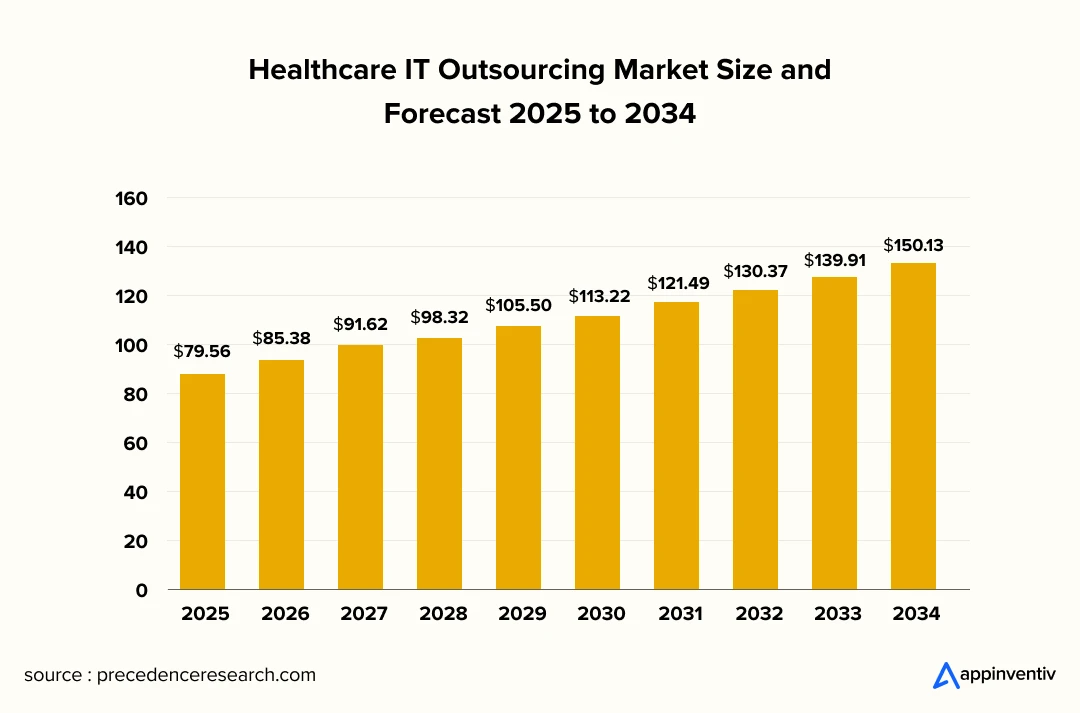
According to Precedence Research, the global healthcare IT outsourcing market size was valued at USD 74.14 billion in 2024 and is projected to reach approximately USD 150.13 billion by 2034, growing at a Compound Annual Growth Rate (CAGR) of 7.31% from 2025 to 2034.
Geographic Market Dynamics
While outsourcing healthcare is a worldwide phenomenon, the United States remains the largest and most mature market, driven by:
- Stringent regulatory requirements, such as HIPAA and HITECH, as well as evolving cybersecurity mandates.
- Significant healthcare IT expenditure; The U.S. healthcare IT software market size was estimated at $166.83 billion in 2024 and is projected to grow significantly, reaching an anticipated $388.99 billion by 2030 with a Compound Annual Growth Rate (CAGR) of 15.46% from 2025 to 2030. (source)
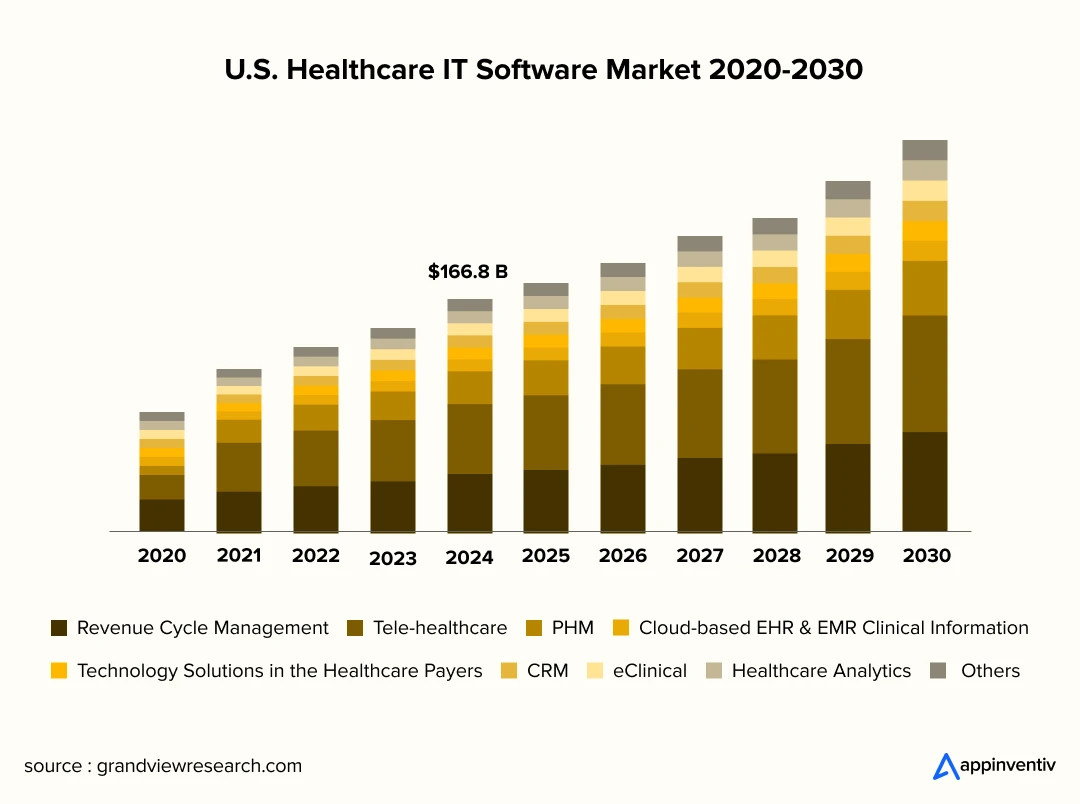
- Accelerated adoption of digital health platforms, including telehealth, electronic health records (EHRs), and patient engagement technologies.
The Europe and Asia-Pacific regions are also witnessing strong growth, driven by increasing regulatory frameworks, such as the GDPR in Europe, which is facilitating the expansion of digital infrastructure.
Market Drivers
1. Increased Healthcare IT Complexity and Operational Costs
Healthcare IT systems today encompass a complex array of electronic health records, medical devices, telehealth platforms, and cloud infrastructure. Managing and integrating these diverse components incurs significant costs. According to Deloitte’s 2025 Global Health Care Outlook, digital transformation, the adoption of advanced technologies such as AI, and enhanced cybersecurity measures are driving significant investments, thereby increasing operational IT costs within healthcare.
Outsourcing enables healthcare providers to reduce capital expenditure, benefit from economies of scale, and leverage vendor expertise to optimize infrastructure costs.
2. Shortage of Skilled Healthcare IT Professionals
A recurring challenge cited by healthcare organizations worldwide is the shortage of qualified IT professionals specialized in healthcare systems. The HIMSS 2025 European Conference, among other recent industry analyses, emphasizes the significant and ongoing healthcare workforce crisis, which inherently includes healthcare IT staff.
Outsourcing fills this talent gap by providing access to expert teams with niche healthcare IT knowledge, such as clinical application development and regulatory compliance expertise.
3. Growing Need for Regulatory Compliance and Data Security
With rising cyberattacks targeting healthcare, the sector faces increasing regulatory scrutiny. The IBM Cost of a Data Breach Report 2024 confirms that healthcare has the highest average data breach cost for the 14th consecutive year, coming in at $9.77 million, highlighting the critical importance of compliance and security. (source)
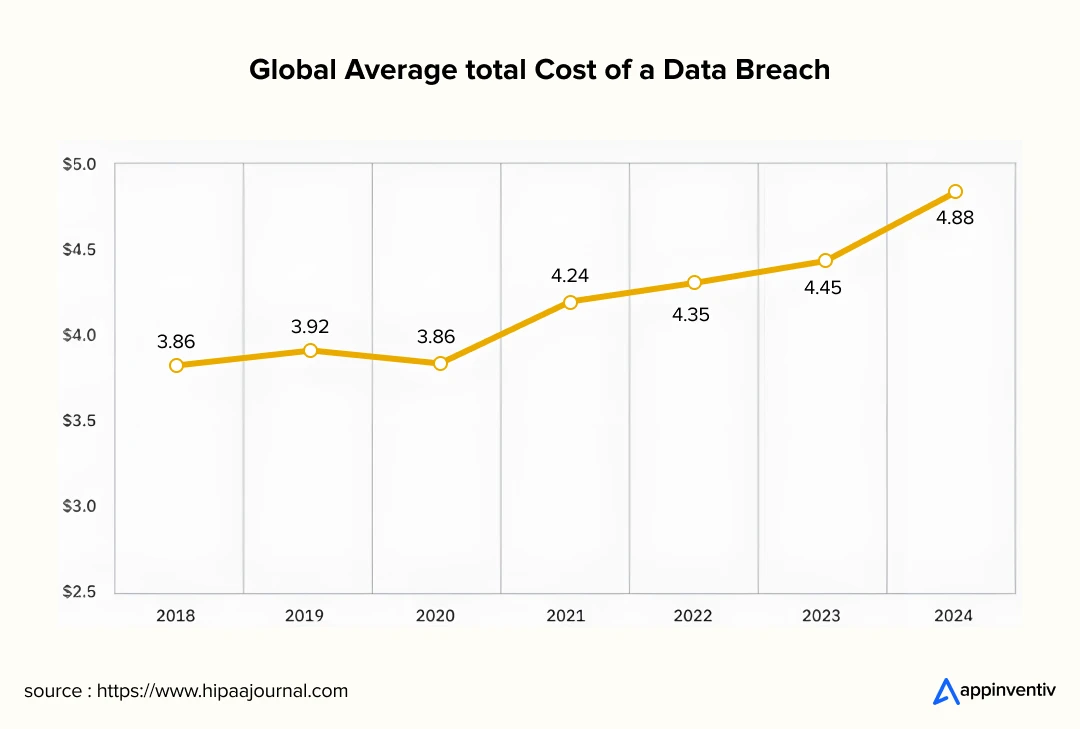
Healthcare IT outsourcing providers often maintain dedicated compliance teams that employ best-in-class security protocols to help healthcare organizations efficiently meet and maintain regulatory requirements.
4. Shift to Value-Based Care Models Requiring Advanced Analytics
The global transition from fee-for-service to value-based care demands sophisticated data analytics to measure patient outcomes and optimize care pathways. Healthcare IT outsourcing firms develop and manage population health management platforms, clinical decision support systems, and predictive analytics tools that enable providers to meet quality and cost-efficiency benchmarks.
5. Accelerated Adoption of AI, IoMT, and Cloud Technologies
Emerging technologies such as artificial intelligence (AI) for diagnostics, Internet of Medical Things (IoMT) devices for remote patient monitoring, and cloud-native healthcare IT architectures have seen rapid adoption globally. A Forbes Technology Council article (2022) emphasizes that these innovations require specialized implementation and ongoing management, often driving healthcare organizations to outsource these complex functions to expert vendors .
Cloud technologies, in particular, facilitate scalable, cost-efficient infrastructure critical for fluctuating healthcare demands, enabling providers to expand or contract IT capabilities seamlessly.
Summary Table: Market Drivers and Impact
| Market Driver | Description | Impact on Healthcare IT Outsourcing Market |
|---|---|---|
| Healthcare IT Complexity & Costs | Growing tech stack complexity and rising operational costs | Increased demand for cost-efficient outsourcing |
| Skilled Workforce Shortage | Lack of qualified healthcare IT professionals globally | Reliance on outsourced specialized talent |
| Regulatory Compliance & Security | Escalating cyber threats and complex data privacy laws | Need for expert compliance management and audits |
| Value-Based Care & Advanced Analytics | Shift requiring robust data analytics and decision support | Outsourcing analytic solutions for performance improvement |
| AI, IoMT & Cloud Adoption | Implementation of emerging healthcare technologies | Increased outsourcing of innovation and infrastructure |
By understanding these market dynamics and drivers, healthcare organizations globally can better appreciate why healthcare IT outsourcing is evolving into a cornerstone of their digital transformation strategies.
Key Benefits of Healthcare IT Outsourcing
Industry has transformed from a simple cost-cutting measure into a strategic enabler that addresses the most pressing challenges facing modern healthcare organizations. As healthcare systems worldwide grapple with increasing operational complexity, regulatory demands, and the need for digital innovation, outsourcing emerges as a powerful solution that delivers tangible value across multiple dimensions.
The following benefits demonstrate how strategic IT partnerships can fundamentally transform healthcare operations while ensuring superior patient care delivery.
Healthcare IT Outsourcing Benefits

Cost Optimization and Financial Predictability
The Challenge: Healthcare organizations face mounting pressure from escalating IT costs, unpredictable technology expenses, and the financial burden of maintaining complex infrastructure. Many struggle with budget overruns due to unexpected system failures, emergency upgrades, and the high cost of retaining specialized IT talent.
The Solution: Outsourcing healthcare IT transforms unpredictable capital expenditures into manageable operational expenses through strategic cost optimization. Organizations achieve substantial savings by eliminating the need for expensive infrastructure investments, reducing overhead costs associated with hiring and training specialized staff, and benefiting from vendors’ economies of scale.
Beyond immediate cost reductions, outsourcing provides budget predictability through fixed-fee arrangements and transparent pricing models. This financial clarity enables healthcare leaders to allocate resources more effectively toward patient care initiatives and strategic growth investments. The predictable cost structure also facilitates better long-term financial planning and reduces the risk of budget surprises that can disrupt healthcare operations.
Healthcare organizations typically experience a 25-40% reduction in total IT operational costs while gaining access to enterprise-grade infrastructure and support services that would be prohibitively expensive to maintain in-house.
Access to World-Class Expertise and Innovation
The Challenge: The healthcare technology landscape evolves rapidly, with new innovations in artificial intelligence, telehealth, IoMT devices, and cloud technologies emerging constantly. Most healthcare organizations struggle to attract and retain top-tier IT talent with specialized healthcare domain knowledge, leaving them unable to leverage cutting-edge technologies that could transform patient care.
The Solution: Outsourcing partnerships provide immediate access to teams of healthcare IT specialists who possess deep domain expertise and stay current with the latest technological advances. These experts bring proven experience in implementing complex healthcare systems, navigating regulatory requirements, and integrating emerging technologies seamlessly into existing workflows.
Healthcare organizations gain access to innovation labs, research and development capabilities, and best practices from across the industry. Outsourcing partners often maintain centers of excellence focused on specific technologies like AI-powered diagnostics, population health analytics, and patient engagement platforms. This expertise accelerates innovation cycles and enables healthcare providers to implement advanced solutions that would take years to develop internally.
The result is faster time-to-market for critical initiatives, improved patient experiences through cutting-edge technology, and the ability to stay competitive in an increasingly digital healthcare landscape.
Comprehensive Compliance and Risk Mitigation
The Challenge: Healthcare organizations face an increasingly complex web of regulatory requirements spanning HIPAA, HITECH, GDPR, and emerging regional privacy laws. The consequences of non-compliance extend far beyond financial penalties, potentially resulting in damaged reputation, loss of patient trust, and operational disruptions. With cyber threats targeting healthcare at unprecedented rates, organizations need robust security frameworks that many cannot build or maintain effectively in-house.
The Solution: Specialized healthcare IT outsourcing partners bring dedicated compliance teams, advanced security protocols, and proven risk management frameworks designed specifically for healthcare environments. These partners maintain current expertise across multiple regulatory jurisdictions and implement comprehensive security measures that exceed industry standards.
Outsourcing partners provide continuous monitoring, proactive threat detection, and incident response capabilities that most healthcare organizations cannot afford to maintain internally. They conduct regular compliance audits, maintain detailed documentation for regulatory reporting, and ensure that all systems and processes meet or exceed current requirements.
The peace of mind that comes from working with compliance experts allows healthcare leaders to focus on patient care while knowing that their organization’s most sensitive data is protected by industry-leading security measures. This approach significantly reduces the risk of costly breaches and compliance violations while ensuring that security measures evolve with the changing threat landscape.
Also Read: HIPAA-Compliant App Development
Dynamic Scalability and Operational Agility
The Challenge: Healthcare demand is inherently unpredictable, with seasonal fluctuations, public health emergencies, and changing patient demographics creating constant operational challenges. Traditional IT infrastructure often cannot scale quickly enough to meet sudden increases in demand, leading to system performance issues, patient dissatisfaction, and missed revenue opportunities.
The Solution: Healthcare IT outsourcing provides elastic scalability that allows organizations to respond rapidly to changing demands without significant capital investment or lengthy procurement cycles. Cloud-based solutions and flexible service models enable healthcare providers to scale resources up or down based on actual needs, ensuring optimal performance during peak periods while avoiding unnecessary costs during slower periods.
This scalability extends beyond basic infrastructure to include specialized services like telehealth support, patient portal management, and analytics capabilities. During health crises or seasonal surges, outsourcing partners can rapidly deploy additional resources, support staff, and technical capabilities to maintain service levels and patient satisfaction.
The agility provided by outsourcing partnerships enables healthcare organizations to pursue new opportunities, expand services, and adapt to market changes without being constrained by IT limitations. This operational flexibility is crucial for maintaining competitive advantage and ensuring sustainable growth in a dynamic healthcare environment.
Strategic Focus on Patient-Centered Care
The Challenge: Healthcare IT complexity often diverts valuable leadership attention and resources away from core patient care activities. Clinical staff may spend excessive time troubleshooting technology issues rather than focusing on patient interactions, while administrators become bogged down in IT management rather than strategic healthcare initiatives.
The Solution: By partnering with healthcare IT specialists, organizations can redirect their internal focus toward activities that directly impact patient outcomes and satisfaction. Outsourcing handles the technical complexity, allowing clinical teams to concentrate on care delivery, innovation in treatment protocols, and patient experience improvements.
This strategic refocusing enables healthcare organizations to pursue value-based care initiatives, implement patient-centered design principles, and develop innovative care delivery models. Leadership can concentrate on strategic planning, quality improvement, and building stronger relationships with patients and communities rather than managing technology infrastructure.
The result is improved patient satisfaction, better clinical outcomes, enhanced staff engagement, and stronger organizational performance across all key healthcare metrics. When technology works seamlessly in the background, healthcare providers can focus on what they do best – caring for patients and improving health outcomes.
Best Practices to Maximize Success in Healthcare Outsourcing Services
Successfully outsourcing healthcare IT functions requires a strategic approach grounded in clear objectives, rigorous partner evaluation, effective communication, flexible methodologies, stringent security, and continuous oversight. Below are best practices that healthcare organizations should adopt to maximize the value and minimize the risks of outsourcing healthcare IT.
Define Clear Business Objectives
Before engaging with any outsourcing partner, healthcare organizations must establish well-defined, measurable objectives aligned with broader organizational goals. Clear objectives help ensure that outsourcing efforts deliver tangible business value and maintain strategic focus.
- Cost Reduction: Quantify targets such as reducing IT operational costs by a specific percentage, or optimizing capital expenditure on hardware and software.
- Compliance Improvement: Set goals around improving compliance audit scores or reducing the number of security incidents year-over-year.
- Accelerated Innovation: Define timelines for software release cycles or deployment of new healthcare technologies, such as AI-powered diagnostic tools or telehealth platforms.
- Operational Efficiency: Establish KPIs related to system uptime, response times for IT support, and user satisfaction among healthcare providers and patients.
Having clear goals enables measurable success and provides criteria to evaluate vendor performance throughout the engagement.
Conduct Rigorous Vendor Evaluation
Choosing the right outsourcing partner is critical, given the complexity and regulatory sensitivities of healthcare IT.
- Healthcare Domain Expertise: Verify that vendors have extensive experience in healthcare environments, demonstrated through past projects involving EHRs, telehealth, population health, and compliance-heavy systems.
- Compliance Certifications: Prioritize vendors certified under frameworks like HITRUST CSF, ISO 27001, and SOC 2 Type II, ensuring adherence to the highest security and privacy standards.
- Technological Competency: Assess the vendor’s expertise in relevant technologies—cloud infrastructure, AI, IoMT integration, and agile software development practices.
- Financial Stability and Reputation: Evaluate financial health to reduce risks of service disruption, and check references or industry reviews to gauge vendor reliability and cultural fit.
Structured vendor due diligence mitigates risks and sets a foundation for a trusted, productive partnership.
Establish Transparent Communication and Governance
Effective communication and governance are pillars of successful outsourcing relationships.
- Shared Project Management Tools: Use platforms such as Jira, Trello, or Microsoft Teams to enable transparent task tracking, issue reporting, and progress visibility for all stakeholders.
- Regular Status Updates: Schedule frequent check-ins and steering committee meetings involving both client and vendor leadership to review milestones, address roadblocks, and recalibrate priorities.
- Clear Roles and Responsibilities: Define accountability structures with designated points of contact on both sides for operational, security, and compliance oversight.
- Collaborative Culture: Foster a partnership mindset rather than transactional relationships to promote proactive problem-solving and innovation.
Transparency in communication ensures alignment, early risk identification, and swift issue resolution.
Adopt Agile Methodologies
Healthcare IT environments are dynamic, with rapidly changing regulatory, clinical, and technological landscapes. Outsourcing teams that employ Agile methodologies provide greater flexibility and faster delivery.
- Iterative Development: Agile enables incremental software builds and testing, reducing risk by catching defects early and incorporating user feedback continuously.
- Rapid Response to Regulatory Changes: Agile allows quick reprioritization and updates to ensure compliance with evolving healthcare regulations.
- Cross-Functional Collaboration: Encourages collaboration between developers, healthcare subject matter experts, and compliance teams, aligning technology with clinical workflows.
- Faster Time-to-Market: Supports quicker rollouts of critical software updates and new features, essential in competitive healthcare markets.
Adopting Agile is crucial for navigating the complexities of outsourcing healthcare IT successfully.
Also Read: How to Hire an Agile Software Development Team
Prioritize Security and Compliance
Security is paramount in healthcare IT outsourcing, given the sensitive nature of patient data and heavy regulatory oversight.
- Data Encryption: Mandate end-to-end encryption for data at rest and in transit using industry-standard protocols (e.g., AES-256).
- Multi-Factor Authentication (MFA): Ensure access to systems is secured with MFA to prevent unauthorized entry.
- Continuous Risk Monitoring: Implement real-time threat detection, regular vulnerability assessments, and incident response mechanisms.
- Compliance Audits: Schedule periodic compliance audits to verify adherence to HIPAA, GDPR, and other applicable standards.
- Business Associate Agreements (BAA): Ensure contracts include BAAs outlining responsibilities and liabilities regarding PHI.
Robust security and compliance protocols are non-negotiable to protect patients and preserve trust.
Continuous Performance Monitoring
Continuous monitoring ensures outsourced services meet or exceed expectations and adapt to changing healthcare needs.
- Define Key Performance Indicators (KPIs): Monitor system uptime, average response time for incident resolution, security incident rates, and user satisfaction.
- Use Dashboards and Analytics: Employ real-time dashboards that provide visibility into operational health and compliance status.
- Regular Reporting: Vendors should deliver detailed performance reports with trend analysis, highlighting successes and areas for improvement.
- Feedback Loops: Establish mechanisms to collect input from end-users (clinicians, administrators, patients) to inform ongoing enhancements.
Ongoing measurement and optimization ensure sustained success and value realization from healthcare IT outsourcing engagements.
Healthcare IT Outsourcing Implementation: A Step-by-Step Guide
Successfully implementing it requires a structured and methodical approach to ensure seamless integration, mitigate risks, and maximize the benefits for patient care and operational efficiency. This guide outlines the essential steps from initial assessment to continuous optimization, providing best practices for each phase of the outsourcing journey.
| Step | Description | Best Practices |
|---|---|---|
| 1. Needs Assessment | Identify gaps, pain points, and compliance risks | Involve cross-functional teams |
| 2. Vendor Research | Shortlist based on healthcare expertise and compliance records | Use a structured RFP process |
| 3. Contract Negotiation | Define SLAs, compliance clauses, and IP rights | Include flexible terms and exit clauses |
| 4. Transition Planning | Detailed knowledge transfer and phased rollouts | Maintain dual support during transition |
| 5. Pilot Deployment | Run a pilot to validate processes and system integration | Gather user feedback and optimize |
| 6. Full Rollout | Gradual scale to full implementation | Use change management strategies |
| 7. Continuous Review | Ongoing monitoring of performance and compliance | Use dashboards and audit tools |
Choosing the Ideal Healthcare Outsourcing Services Partner: A Strategic Approach
Selecting the right partner for your healthcare IT needs is perhaps the most critical step in successful outsourcing. It extends beyond merely identifying technical capabilities; it’s about finding a strategic ally who understands the nuances of the healthcare landscape, can integrate seamlessly with your operations, and is committed to your long-term success. While our best practices guide touches upon vendor evaluation, this section delves deeper into the strategic considerations for making an informed choice.

1. Strategic Alignment and Shared Vision: Look for a partner whose organizational values and long-term vision align with yours. Do they truly understand your mission to enhance patient care and operational efficiency? A strong partner will act as an extension of your team, not just a service provider. They should be keen to understand your unique challenges and contribute proactively to your strategic goals, ensuring that their healthcare outsourcing services are not just transactional but transformational.
2. Proven Healthcare Domain Expertise Beyond Technical Skills: While technical prowess is non-negotiable, deep healthcare domain expertise is paramount. Assess their understanding of clinical workflows, regulatory shifts (like the nuances of HIPAA, GDPR, DISHA), and specific challenges within various healthcare segments (e.g., hospitals, pharmaceuticals, clinics).
Look for concrete examples of how they’ve navigated complex healthcare IT projects, demonstrating their familiarity with EHR systems, patient engagement platforms, or specialized medical device integration. At Appinventiv, for instance, our experience spans a wide array of healthcare solutions, ensuring we speak your language and understand your specific needs.
3. Robust Security, Compliance, and Data Privacy Frameworks: Given the sensitive nature of Protected Health Information (PHI), your partner must possess an ironclad commitment to security and compliance. Go beyond basic certifications. Inquire about their comprehensive security frameworks, incident response plans, and their continuous monitoring capabilities. Verify their adherence to global standards like HITRUST CSF, ISO 27001, and SOC 2 Type II. This due diligence ensures your patient data is protected, and your organization remains compliant with evolving regulations.
4. Scalability, Flexibility, and Innovation Capacity: The healthcare sector is dynamic. Your chosen partner should offer flexible engagement models that allow for seamless scaling of resources up or down based on your evolving needs, whether it’s for a new telehealth initiative or managing data spikes.
Furthermore, assess their commitment to innovation; do they invest in R&D for emerging technologies like AI, IoMT, and Blockchain? A forward-thinking healthcare IT consulting services provider like Appinventiv will help you leverage cutting-edge solutions to stay competitive and improve patient outcomes.
5. Transparent Communication and Governance Structure: Effective partnerships are built on transparency and clear communication. Evaluate the vendor’s proposed communication protocols, reporting mechanisms, and governance structure. Will they provide dedicated account managers? Are their project management methodologies collaborative and open?
A partner that fosters an environment of open dialogue and clear accountability will ensure that projects stay on track and challenges are addressed promptly and effectively.
6. Cultural Fit and Talent Pool Depth: Beyond technical skills, consider the cultural compatibility between your organization and the outsourcing partner. A good cultural fit facilitates smoother collaboration, better problem-solving, and a more integrated team environment. Also, delve into the depth and breadth of their talent pool.
Do they have sufficient resources to handle your current and future demands without compromising quality? Our team at Appinventiv is built on a foundation of collaborative spirit and deep technical expertise, ensuring a seamless extension of your in-house capabilities.
7. References, Case Studies, and Client Testimonials: Always request references from current and past healthcare clients. Speak directly with these references to gather insights into the vendor’s performance, problem-solving abilities, and overall partnership quality. Reviewing relevant case studies provides tangible evidence of their experience and successful outcomes in similar projects.
How We Helped DiabeticU Launch an AI-Powered Diabetes Management Solution
Client Profile: DiabeticU is an innovative startup focused on empowering individuals with diabetes to take control of their health. Their vision was to develop an application that not only simplifies diabetes management but also proactively supports users in leading healthier lives.
Challenges: The client sought to develop a solution that would:
- Simplify Complex Management: Diabetes requires constant self-management (blood sugar tracking, diet, exercise, medication), which can be overwhelming.
- Ensure Data Security & Compliance: The application needed to be scalable, secure, and compliant with medical standards, particularly HIPAA, to protect sensitive user data.
- Provide Personalized Guidance: Users needed customized support that adapted to their unique needs and daily habits, moving beyond generic advice.
- Foster Community and Support: The isolated nature of managing a chronic condition highlighted the need for a platform to connect users with peers and professionals.
- Integrate with Wearables: Seamless integration with wearable devices was necessary for real-time data tracking and a holistic health overview.
Our Solution: Appinventiv designed and developed a comprehensive diabetes management app, DiabeticU, with key features addressing these challenges:
- Personalized Management Tools: Features include personalized meal plans, exercise schedules, medication tracking, and blood sugar tracking.
- AI-Powered Virtual Assistant: An AI assistant analyzes daily habits (dietary intake, exercise, medication adherence, blood sugar levels) to provide customized and adaptive guidance.
- Seamless Wearable Integration: The app integrates with wearable devices to provide real-time health data.
- Robust Security & Compliance: Utilized advanced technologies like AWS Auto Scaling, Elastic Load Balancing, AWS Key Management Service (KMS), and Amazon S3 with Server-Side Encryption (SSE-S3) to ensure HIPAA compliance and data security. Lifecycle policies archive old data to Glacier for cost-efficiency.
- Community & Professional Connection: Connects users with an online community of like-minded individuals and diabetes professionals for support and shared experiences.
- Highly Available & Scalable Architecture: Developed with a resilient architecture to ensure high availability and scalability, protecting sensitive data.
Results: The launch of the DiabeticU app marked a significant milestone in diabetes management:
- Enhanced User Empowerment: Its user-friendly interface and comprehensive features made it an essential tool for thousands, empowering them to effectively manage their health.
- Improved Health Outcomes: The integration of real-time data tracking with personalized health insights revolutionized how users manage their condition, leading to improved health outcomes and a better quality of life.
- Unique Differentiators: The AI-powered virtual assistant and the focus on a supportive community distinguished DiabeticU from other applications.
- Secure and Scalable Platform: Demonstrated a secure and highly available platform resilient to failures and compliant with security standards.
Healthcare IT Outsourcing: A Strategic Imperative for Future-Ready Care
At Appinventiv, we recognize that outsourcing healthcare IT has evolved beyond a cost-saving option into a strategic imperative for organizations seeking to thrive in today’s complex healthcare landscape. By thoughtfully partnering with specialized vendors like us, healthcare providers can unlock significant value — from reducing operational costs and navigating stringent regulatory environments to accelerating access to cutting-edge technologies like AI and IoT.
We believe the true power of outsourcing lies in its ability to transform IT from a challenge into a catalyst for innovation. This enables healthcare organizations to scale flexibly, enhance security, and focus squarely on what matters most: delivering superior patient care. However, realizing these benefits requires a disciplined approach grounded in best practices—clear objectives, rigorous vendor selection, agile methodologies, and uncompromising security, all of which we prioritize in our consulting services.
For healthcare providers ready to embrace this journey, our healthcare software development services offer a proven path to operational resilience, sustained compliance, and competitive advantage in an ever-evolving digital ecosystem. As the healthcare sector continues to advance, we empower those who harness the full potential of healthcare IT outsourcing to lead the way in shaping the future of patient-centered care.
Frequently Asked Questions (FAQs)
Q. What is healthcare IT outsourcing, and what does the global healthcare IT outsourcing market look like?
A. Outsourcing Healthcare IT refers to the strategic delegation of technology-related functions—such as software development, IT infrastructure management, and compliance—to external vendors. The healthcare IT market is currently experiencing robust global growth, projected to expand significantly by 2032.
Q. Why Healthcare Providers Outsource IT Services?
A. Healthcare providers outsource IT services to achieve cost efficiencies, access specialized talent, ensure regulatory compliance, enhance scalability, and redirect focus to core patient care. This strategic approach is increasingly vital within the broader outsourcing in the healthcare industry.
Q. What are the key benefits of outsourcing in healthcare?
A. The primary benefits of outsourcing in healthcare IT include substantial cost savings (e.g., reducing operational expenses by over 20%), faster adoption of cutting-edge technologies like AI and IoMT, improved regulatory adherence, and increased operational agility. This helps drive the healthcare outsourcing industry forward.
Q. What IT Functions do healthcare organizations outsource, and what are some examples of healthcare outsourcing services?
A. IT functions outsourced in healthcare commonly include custom software development (like EHR customization), IT infrastructure management, data security & compliance, and specialized patient support outsourcing. Other examples of outsourcing in healthcare involve organizations choosing to outsource healthcare software development or leveraging healthcare software development outsourcing for specific projects. These represent various Types of Healthcare Technology Services.
Q. What are the major Challenges in Healthcare IT Outsourcing?
A. Key Challenges includes ensuring robust data security and privacy (especially for Protected Health Information – PHI), seamless integration with existing legacy systems, overcoming potential communication barriers, and navigating complex, multi-jurisdictional regulations.
Q. How to Choose the Right Healthcare IT Partner?
A. To choose the right IT partner for a healthcare project, organizations must define clear objectives, conduct rigorous vendor evaluations (assessing healthcare domain expertise, compliance certifications like HITRUST, and technological competency), and establish transparent communication and robust governance for successful outsourcing healthcare IT engagements.
Q. How much does an outsourced healthcare IT project cost?
A. The cost varies widely based on the scope, scale, and complexity of services. However, outsourcing in healthcare IT typically leads to significant long-term cost reductions and optimization compared to managing functions entirely in-house, due to economies of scale and specialized expertise.
Q. What is the Future of Healthcare IT Outsourcing?
A. The Future of Outsourcing Healthcare IT will be significantly shaped by the rapid adoption of AI and Machine Learning, expanded telehealth and remote patient monitoring, blockchain technology for enhanced data security, and the increasing reliance on cloud-native architectures, all driving more strategic vendor partnerships.
Q. What is the Process of outsourcing Healthcare IT?
A. The typical Process involves a structured approach: beginning with a comprehensive needs assessment, followed by rigorous vendor research, contract negotiation, transition planning, pilot deployment, full rollout, and continuous performance review. These are crucial elements for maximizing success.
Q. Does hospital IT outsourcing offer unique advantages?
A. Yes, hospital IT outsourcing provides specific benefits such as highly specialized support for complex clinical systems, enhanced cybersecurity measures tailored for sensitive patient data within hospital networks, and scalable IT infrastructure capable of adapting quickly to dynamic hospital demands and patient surges.
Q. What are the key technology trends shaping the future of Healthcare IT Outsourcing?
A. The future will be significantly shaped by several key technological advancements:
- AI and Machine Learning (AI/ML): These technologies automate diagnostics and patient risk stratification, which reduces workload and enhances care quality.
- Telehealth and Remote Monitoring: Outsourced platforms for virtual visits and Internet of Medical Things (IoMT) devices are crucial for supporting chronic disease management remotely.
- Blockchain Technology: This technology improves data security and interoperability, ensuring tamper-proof medical records.
- Cloud-Native Architectures: These architectures increase scalability and reduce infrastructure overhead, which is critical for fluctuating healthcare demands and enables seamless expansion or contraction of IT capabilities.
Q. What’s the difference between healthcare outsourcing and managed IT services?
A. Healthcare outsourcing involves delegating specific functions, such as medical billing or transcription, to external vendors. Managed IT services, on the other hand, provide comprehensive IT support, including infrastructure management, cybersecurity, and compliance assistance, often with a subscription-based model. Managed IT services offer more integrated, ongoing support compared to the task-specific approach of outsourcing.


- In just 2 mins you will get a response
- Your idea is 100% protected by our Non Disclosure Agreement.
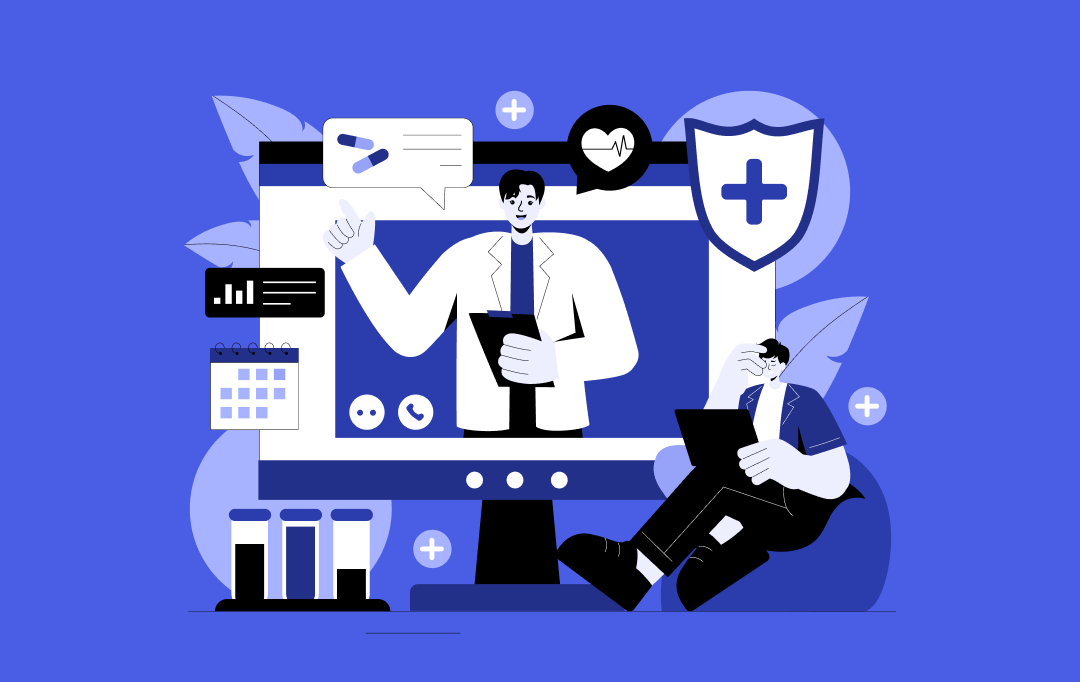
Healthcare 4.0: Redefining the Future of Connected Care and Clinical Intelligence
Key Takeaways Healthcare 4.0's ecosystem is autonomous and patient-centric, integrating AI, IoT, and cloud computing. AI-driven clinical intelligence enhances personalized care for healthcare professionals and improves patient outcomes through predictive analytics. IoT and AI are being implemented in smart hospitals to improve operational efficiency, resource management, and patient care. Connected care enables better patient empowerment…
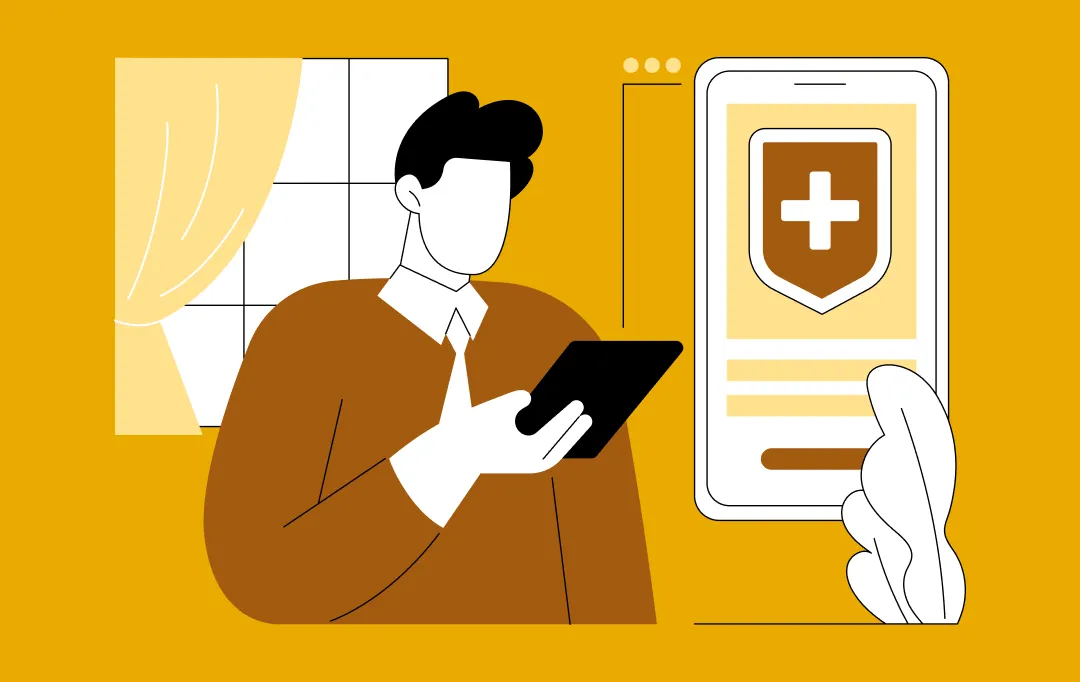
How To Build A Custom Behavioral Health Software? Costs, Features & Compliances
Key Takeaways Custom behavioral health software development supports the unique needs of therapy work that many general EHR tools do not cover well. Start with the foundational modules. Clinical notes, scheduling, billing, and security should be the first modules you build. Treatment plans and consent controls are important for safe and organized care, so they…
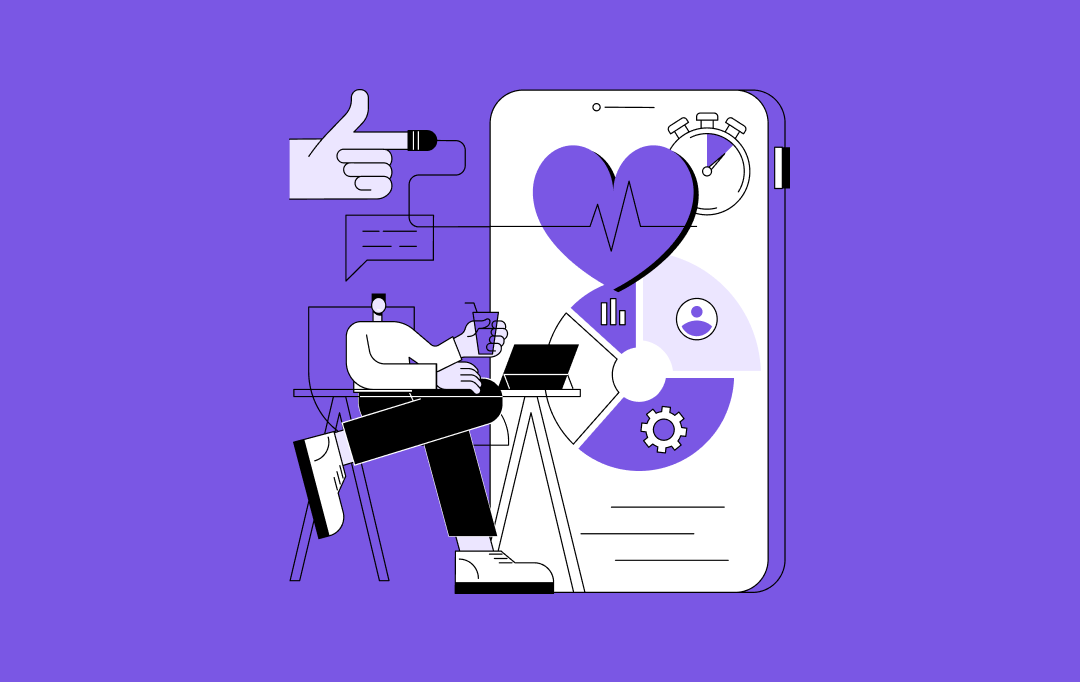
How Custom Healthcare App Development is Powering Digital-First NHS Care
Key Highlights: NHS teams are moving fast toward digital-first care, and custom apps are filling gaps that the standard NHS App cannot cover. Custom healthcare apps help reduce workload, cut waiting times, and improve how patients access care across Trusts and ICS regions. UK rules such as DTAC, NHS DSP Toolkit, NHS Login, and UK…


























